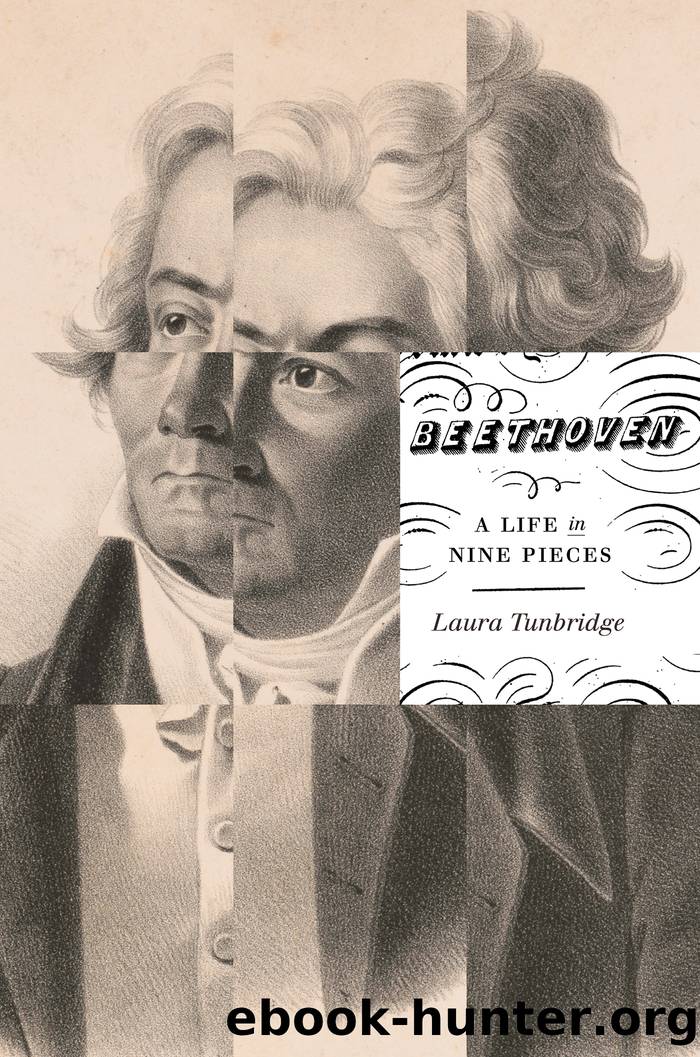Beethoven: A Life in Nine Pieces by Laura Tunbridge

Author:Laura Tunbridge [Tunbridge, Laura]
Language: eng
Format: epub
Tags: Biography & Autobiography, music, Individual Composer & Musician, Genres & Styles, Classical
ISBN: 9780300257977
Google: x0YAEAAAQBAJ
Publisher: Yale University Press
Published: 2020-10-26T00:24:29.065523+00:00
6. Liberty: Fidelio, op. 72 (1814)
In celebration of the allied armiesâ very recent victory over Napoleon in France, on 11 April 1814 there was a performance at Viennaâs Kärtnertortheater of Die gute Nachricht (The Good News). Bruno, a local landlord, has promised his daughter Hannchenâs hand in marriage to whoever brings the longed-for news that Paris has fallen. Fortunately for Hannchen, her beloved Robert beats his rival by using her fatherâs white dove to deliver the message to the villagers, who break into song: âGermania! Germania!â
Die gute Nachricht had been hastily devised by playwright Georg Friedrich Treitschke. It is a Singspiel, a type of German opera with spoken dialogue, and, appropriately, was a display of Viennese musical talents, with arrangements of numbers by Johann Nepomuk Hummel, Joseph Weigl, Adalbert Gyrowetz, Friedrich August Kanne, and some repurposed Mozart. The concluding chorus was newly composed by Beethoven.1 Amid its celebration of German virtues, Treitschkeâs five verses for âGermania!â namecheck the newly victorious allied leaders: Russiaâs Czar Alexander, Friedrich Wilhelm of Prussia and, finally, the Austrian emperor, Franz. The musicâs popularity is apparent in the decision to publish it immediately in piano arrangement, and the rousing chorus was successful enough to be used in performances of Treitschkeâs next production, Die Ehrenpforten (The Gates of Glory), given in honour of the emperorâs name day. (This was a Catholic tradition by which children would be named according to the calendar of saintsâ feasts, which was extended to certain names being celebrated on certain dates. In an era when birth dates could be uncertain â as was the case with Beethoven â name days were reliable party prompts.) On sending a copy of the piano version of the chorus to Archduke Rudolph, Beethoven made the grand claim that âthe song âGermania!â belongs to the whole worldâ.2
Download
This site does not store any files on its server. We only index and link to content provided by other sites. Please contact the content providers to delete copyright contents if any and email us, we'll remove relevant links or contents immediately.
Kathy Andrews Collection by Kathy Andrews(11839)
The remains of the day by Kazuo Ishiguro(9002)
Spare by Prince Harry The Duke of Sussex(5200)
Paper Towns by Green John(5194)
The Body: A Guide for Occupants by Bill Bryson(5100)
Industrial Automation from Scratch: A hands-on guide to using sensors, actuators, PLCs, HMIs, and SCADA to automate industrial processes by Olushola Akande(5063)
Machine Learning at Scale with H2O by Gregory Keys | David Whiting(4314)
Be in a Treehouse by Pete Nelson(4055)
Never by Ken Follett(3960)
Harry Potter and the Goblet Of Fire by J.K. Rowling(3864)
Goodbye Paradise(3812)
The Remains of the Day by Kazuo Ishiguro(3414)
Into Thin Air by Jon Krakauer(3402)
Fairy Tale by Stephen King(3401)
The Cellar by Natasha Preston(3347)
The Genius of Japanese Carpentry by Azby Brown(3310)
120 Days of Sodom by Marquis de Sade(3276)
Reminders of Him: A Novel by Colleen Hoover(3123)
Drawing Shortcuts: Developing Quick Drawing Skills Using Today's Technology by Leggitt Jim(3084)
